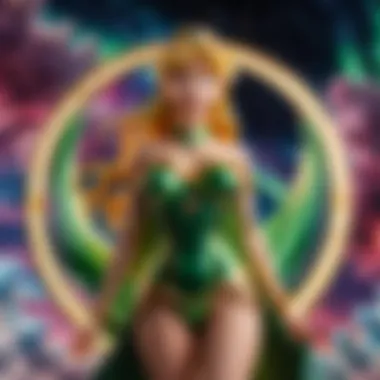Unveiling the Mysteries of Heaven: A Unique Interpretation


Featured Figures and Merchandise
When it comes to \
Introduction
Defining Heaven
Theoretical Concepts
Theological Perspectives
Historical Views
In delving into the multifaceted concept of heaven, understanding its historical views proves invaluable in unraveling the depth and significance of this ethereal subject. Historical perspectives offer a nuanced foundation upon which contemporary interpretations are built. By examining how ancient civilizations conceptualized heaven, we gain insight into the evolution of beliefs and philosophies across time. Recognizing the historical context enriches our comprehension of the transcendent realm, shedding light on its enduring appeal and relevance.
Ancient Civilizations
Egyptian
Exploring the Egyptian perception of heaven unveils a rich tapestry of symbolism and mythology that permeated their cosmological understanding. The Egyptians viewed heaven as a realm of eternal bliss and rebirth, intricately linked to their funerary practices and beliefs in the afterlife. The concept of Ma'at, representing cosmic order and harmony, was central to their interpretation of heaven, underscoring the value they placed on balance and righteousness. The enduring allure of Egyptian imagery and rituals in depictions of heaven speaks to the timeless quality of their traditions, offering a tangible connection to the mysteries of the divine.
Greek
The Greek perspective on heaven encompassed a pantheon of gods and goddesses residing atop Mount Olympus, symbolizing a celestial realm where deities ruled over mortal affairs. Greek mythology imbued heaven with narratives of heroism, tragedy, and splendor, reflecting human aspirations and flaws through divine allegory. The concept of Elysium, a paradise for the virtuous and heroic, epitomized the Greek ideal of an afterlife befitting honorable souls. The enduring influence of Greek mythology in shaping Western cultural perceptions of heaven underscores its enduring relevance and resonance in contemporary discourse.
Roman


In Roman cosmology, heaven was envisaged as a place of divine reward and apotheosis, where the righteous souls ascended to join the ranks of gods and deities. The Roman concept of the Elysian Fields mirrored Greek notions of a blessed afterlife, depicting a realm of eternal bliss and tranquility for the deserving. Through syncretism with Greek beliefs and incorporation of indigenous traditions, Roman views of heaven blended elements of various cultures, reflecting a diverse and inclusive cosmological vision. The enduring legacy of Roman art and literature in portraying heavenly realms enriches our understanding of the transcendent beyond cultural boundaries, emphasizing the universal human longing for transcendence and fulfillment.
Religious Interpretations
In understanding the concept of heaven, religious interpretations hold significant importance. They serve as foundational pillars that mold our perceptions of the transcendent realm, offering insights into belief systems and cultural frameworks. Religious interpretations delve into the complexities of afterlife, salvation, and divine presence, providing a profound lens through which individuals navigate existential questions. Within this article, exploring religious interpretations sheds light on the diverse perspectives and traditions that shape our understanding of heaven, illustrating the rich tapestry of human spirituality and metaphysical beliefs.
Christianity
The Bible
Delving into the specifics of the Christian tradition, The Bible emerges as a cornerstone text that elucidates the nature of heaven and its significance within religious discourse. It encompasses a collection of scriptures, parables, and teachings that outline the divine plan for salvation and eternal life. The Bible serves as a source of moral guidance, illuminating the path to righteousness and spiritual fulfillment. Its narratives of heavenly visions, angelic encounters, and eschatological prophecies offer a glimpse into the celestial realm, inspiring hope and faith among believers.
The Afterlife
Within Christian theology, the concept of the afterlife stands as a pivotal tenet that underpins the notion of heaven. It represents the eternal destination of souls after physical death, emphasizing divine judgment, resurrection, and ultimate reunion with God. The afterlife, as portrayed in the Christian faith, embodies a realm of spiritual rewards and repercussions, reflecting the moral choices made during one's earthly sojourn. Exploring the intricacies of the afterlife expands our comprehension of heaven's significance, underscoring the themes of redemption, mercy, and eternal bliss.
Cultural Depictions
Cultural Depictions play a pivotal role in providing a multidimensional understanding of the concept of heaven in this article. By exploring how different cultures represent the notion of heaven through various mediums, such as literature and art, we gain a deeper insight into the diverse ways this transcendent realm is perceived. Cultural Depictions not only enrich the narrative but also give readers a broader perspective on the complexities and nuances of heaven across different societies. This section aims to shed light on the significance of cultural diversity in shaping our understanding of heaven, showcasing the rich tapestry of beliefs and interpretations that contribute to its mystique.
Literature
Mythology
Delving into Mythology offers a fascinating lens through which to examine the concept of heaven. Mythological stories and folklore provide us with allegorical narratives that navigate themes of the afterlife, divine realms, and celestial beings. The allure of Mythology lies in its ability to transcend time and culture, offering timeless wisdom and timeless wisdom. It adds a layer of complexity and depth to our exploration of heaven, inviting us to ponder the universal motifs and archetypes that populate these enduring tales. Mythology's enduring relevance in this article stems from its ability to capture the collective imagination and tap into primal aspects of the human psyche, making it a compelling choice for elucidating the enigmatic realm of heaven in a profound and engaging manner.
Modern Fiction
Exploring Modern Fiction provides a contemporary perspective on heaven, blending imaginative storytelling with modern-day themes and sensibilities. The evolution of literature has introduced innovative ways to conceptualize heaven, intertwining elements of fantasy, science fiction, and speculative fiction to offer fresh interpretations of the afterlife. Modern Fiction injects a sense of relevance and relatability into our discussion of heaven, reflecting current societal values and existential questions. Its capacity to challenge traditional notions of heaven while pushing the boundaries of creativity makes Modern Fiction a dynamic and pertinent resource in examining the concept of heaven in an ever-evolving world. By leveraging the narrative versatility of Modern Fiction, this article strives to present a diverse portrayal of heaven that resonates with readers across various backgrounds and interests, sparking intrigue and introspection.


Philosophical Considerations
Philosophical Considerations play a crucial role in shedding light on the intricate nature of the concept of heaven. Within the context of this article, delving into philosophical perspectives offers a profound understanding of the deeper implications and rationalizations behind the idea of a transcendent realm. By exploring various philosophical theories and frameworks, we can dissect the ethical, metaphysical, and existential aspects of heaven, enriching our exploration with critical thinking and intellectual depth. Philosophical Considerations serve as a guiding beacon, leading us through a labyrinth of ideas and beliefs surrounding the concept of heaven.
Ethical Implications
In the realm of ethical implications within the discussion of heaven, Aristotle's Views present a unique vantage point that intertwines virtue ethics with the pursuit of eudaimonia. Aristotle's emphasis on moral virtues, ethical character, and the ultimate aim of human existence contributes significantly to our comprehension of the moral dimensions of heaven. His concept of the 'Golden Mean' emphasizes moderation, a balance between extremes that can be applied to ethical considerations within the context of heaven. While Kantian Ethics, with its categorical imperative and emphasis on duty, brings forth a contrasting yet complementary ethical framework. Kant's view on universal morality imparts a sense of moral absolutism, underscoring the importance of ethical principles in navigating the complexities of heavenly ideals. The juxtaposition of Aristotle's focus on character and virtues with Kant's emphasis on moral duties provides a well-rounded ethical discourse within the exploration of heaven.
Aristotle's Views
Delving further into Aristotle's Views signifies an exploration of virtue ethics and its relevance to the overarching theme of heaven. Aristotle's concept of virtue as a mean between extremes encapsulates the essence of leading a morally virtuous life. The notion that virtues are habits developed through practice embeds a practical approach to ethical living, resonating with the idea of striving towards an ideal state, which echoes in the contemplation of heaven. The inherent teleology in Aristotle's ethical framework, where the goal is eudaimonia or flourishing, aligns with the aspirational nature of seeking a heavenly realm where ultimate fulfillment is realized. Despite criticisms of potential cultural bias and subjectivity in virtue ethics, Aristotle's emphasis on ethical cultivation and excellence remains particularly pertinent in shaping our understanding of heavenly ethics.
Kantian Ethics
Turning our attention to Kantian Ethics engrosses us in a moral philosophy underpinned by the notion of duty and universal moral laws. Kant's emphasis on intention and the intrinsic value of acting from a sense of duty rather than inclination provides a contrasting perspective to Aristotle's virtue-based ethics. The categorical imperative, central to Kantian Ethics, mandates that moral actions must be universalizable, devoid of personal inclinations or consequences, thereby fostering a sense of moral duty that transcends situational contexts. The deontological nature of Kantian Ethics offers a compelling framework for evaluating ethical decisions pertaining to heaven, grounding our moral considerations in principles that emanate objectivity and universality. While criticisms of Kantian Ethics include potential rigidity and absolutism, its emphasis on the inherent worth of individuals and the moral law within invites profound reflections on the ethical landscape of heaven.
Scientific Perspectives
In delving into the multifaceted concept of heaven, it becomes imperative to examine the scientific perspectives surrounding this transcendent realm. Scientific viewpoints offer a unique and empirical lens through which to analyze the concept of heaven, bringing forth a blend of theoretical frameworks and observational insights that enrich our understanding. By incorporating scientific perspectives into this exploration, we not only bridge the gap between faith-based interpretations and tangible realities but also invite a nuanced dialogue on the nature of transcendence and existence.
Physics
Quantum Mechanics
Quantum Mechanics stands as a cornerstone in the scientific understanding of the universe, delving into the intricate and often perplexing nature of subatomic particles and their behavior. Within the context of exploring heaven, Quantum Mechanics introduces the notion of unpredictability and non-linear dynamics, challenging traditional conceptualizations of space and time. Its quantum superposition principle, where particles exist in multiple states simultaneously, offers a captivating parallel to the diverse interpretations of heaven across cultures. This feature of Quantum Mechanics not only sparks philosophical contemplation on the nature of reality but also underscores the complexity and mystery inherent in addressing transcendental concepts. While Quantum Mechanics brings about a layer of depth to this examination of heaven, its inherent probabilistic nature introduces a level of uncertainty that mirrors the enigmatic nature of the afterlife.
Cosmological Theories
Cosmological Theories present a broader perspective on the cosmic landscape, exploring the origins, evolution, and potential fates of the universe. Within the context of this article, examining heaven through the lens of Cosmological Theories allows for a contemplation of scale and magnitude beyond terrestrial boundaries. The key characteristic of Cosmological Theories lies in their ability to weave together observational data and theoretical models to elucidate the grand tapestry of the cosmos. By integrating these theories into the discourse on heaven, we expand our horizons to consider the celestial intricacies that may transcend conventional religious narratives. The unique feature of Cosmological Theories lies in their capacity to blend empirical evidence with imaginative speculation, offering a holistic perspective on existence and its metaphysical extensions. While Cosmological Theories enrich our exploration of heaven by fostering a cosmic context, their speculative nature reminds us of the limits of human knowledge and the vastness of the unknown.


This article ventures into the intersection of scientific perspectives and metaphysical concepts, weaving together strands of empirical data and philosophical inquiry to shed light on the enigmatic realm of heaven. By embracing the synergy between scientific curiosity and existential contemplation, we embark on a journey that transcends disciplinary boundaries, inviting readers to ponder the mysteries of existence and transcendence.
Artistic Representations
In this article, the exploration of heaven delves into the realm of artistic representations, offering a unique perspective that adds layers of depth to the ethereal subject. Artistic representations play a crucial role in providing visual interpretations of abstract concepts, allowing viewers to connect with the intangible aspects of heaven on a more visceral level. The inclusion of artistic representations serves to bridge the gap between imagination and reality, offering a tangible manifestation of transcendent themes. By incorporating artwork, this article aims to evoke emotions, spark contemplation, and stimulate the viewer's imagination.
Paintings
Renaissance Art
Renaissance Art stands out as a pivotal aspect of artistic representations within the context of heaven exploration. Its meticulous attention to detail, use of light and perspective, and emphasis on human emotion make it an ideal choice for portraying celestial themes. The key characteristic of Renaissance Art lies in its ability to infuse religious and mythological narratives with rich symbolism and allegory, conveying profound spiritual messages. The intricate symbolism and technical skill displayed in Renaissance Art greatly contribute to the thematic depth of this article, providing a historical and cultural connection to heavenly concepts. Despite its complexity, Renaissance Art offers a visually captivating experience that enhances the audience's engagement with the transcendent subject matter.
Impressionism
Impressionism adds a contrasting yet complementary layer to the artistic representations of heaven. Known for its emphasis on capturing fleeting moments and sensations, Impressionism brings a sense of fluidity and emotional resonance to depictions of the divine. The key characteristic of Impressionism lies in its use of vivid colors, visible brushstrokes, and avant-garde compositions, providing a refreshing departure from traditional artistic conventions. Incorporating Impressionist pieces into this article introduces a modern and dynamic perspective on heaven, inviting the audience to explore ethereal themes through a contemporary lens. The unique feature of Impressionism lies in its ability to evoke mood and atmosphere through suggestive rather than precise renderings, adding a layer of subjectivity that complements the exploration of heaven's limitless possibilities.
Contemporary Perceptions
In the realm of exploring the concept of heaven through a unique illustration, understanding contemporary perceptions plays a pivotal role. Contemporary perceptions offer invaluable insights into how modern society views and interprets the idea of heaven. By delving into contemporary perspectives, we can unravel the evolving nuances and relevance of this timeless concept in today's world.
Contemporary perceptions provide a lens through which we can analyze societal values, cultural trends, and individual beliefs concerning heaven. This section aims to bridge the gap between traditional notions of heaven and the dynamic interpretations that emerge in contemporary culture. By scrutinizing contemporary perceptions, we can appreciate the diverse range of attitudes and ideologies that shape our understanding of the transcendent realm.
Pop Culture
Movies
Within the realm of pop culture, movies serve as a powerful medium for portraying diverse depictions of heaven. Movies offer a visual and emotional exploration of the concept, bringing to life various interpretations through captivating storytelling and cinematic techniques. The allure of movies lies in their ability to evoke profound emotions, provoke thought, and stimulate imaginations, making them a compelling choice for delving into the enigmatic realms of heaven.
The unique allure of movies lies in their immersive nature, allowing viewers to experience heavenly realms in a vivid and engaging manner. Whether through fantastical landscapes, ethereal beings, or moral dilemmas, movies present an array of perspectives on heaven that enrich our contemplation of its mysteries. While movies can offer a fictionalized portrayal of heaven, they also prompt viewers to reflect on their own beliefs and perceptions of the afterlife.
Music
In the realm of pop culture, music serves as a soul-stirring avenue for exploring the ethereal realm of heaven. Music has the remarkable ability to evoke emotions, convey narratives, and delve into the depths of human spirituality. Through melody and lyrics, music encapsulates the essence of heaven, offering listeners a transcendent experience that resonates on a profound level.
The enchanting allure of music lies in its ability to transcend linguistic barriers and communicate profound truths about the concept of heaven. Whether through uplifting choruses, introspective ballads, or celestial symphonies, music captures the essence of heavenly beauty and serenity. While music may not provide a visual representation of heaven like movies, it creates an immersive auditory journey that touches the hearts and minds of listeners.



